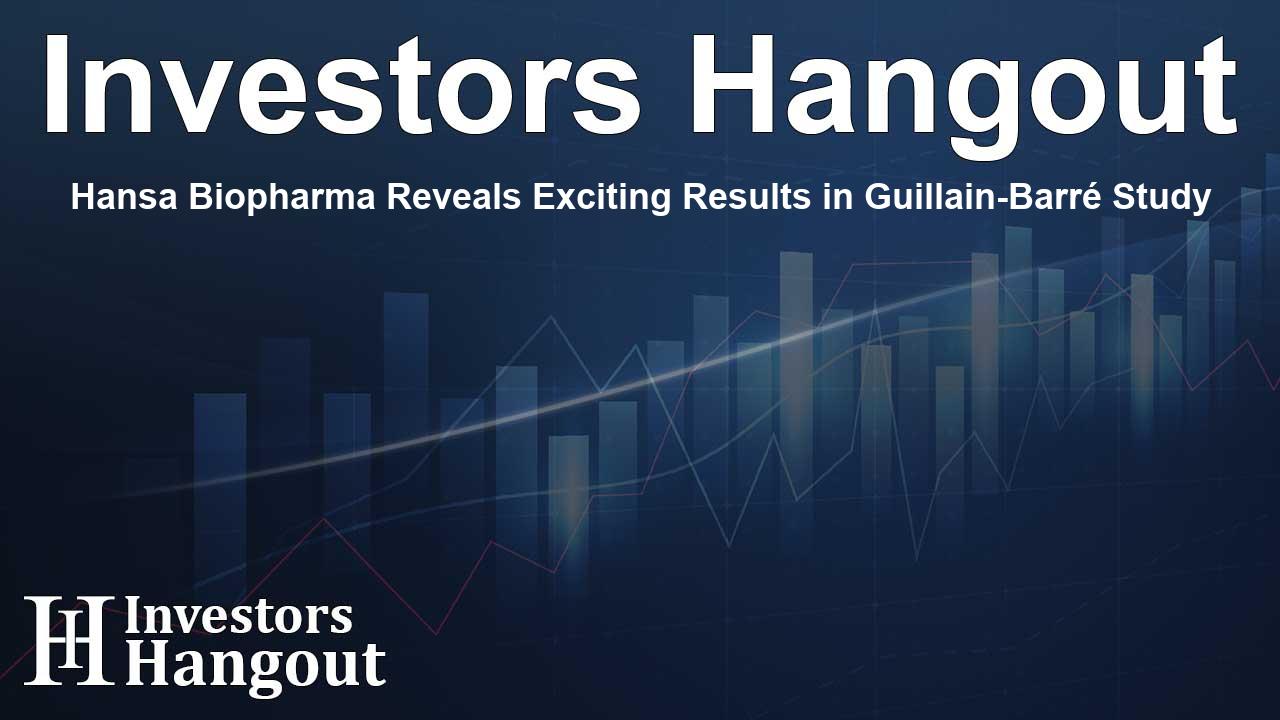Hansa Biopharma Reveals Exciting Results in Guillain-Barré Study

Positive Developments in the Treatment of Guillain-Barré Syndrome
Hansa Biopharma, known for its innovative biologic therapies, has announced significant findings from its Phase 2 study focusing on imlifidase, a groundbreaking IgG-cleaving enzyme, in the treatment of Guillain-Barré Syndrome (GBS). This study reveals the potential benefits of incorporating imlifidase in treatment regimens for patients suffering from this challenging neurological disorder.
Study Overview and Key Findings
The 15-HMedIdeS-09 study involved 30 adult patients, all diagnosed with severe GBS. The results showed that those receiving a single dose of imlifidase alongside intravenous immunoglobulin (IVIg) experienced substantial improvements in their functional abilities. Specifically, patients returned to walking independently in a median time of just 16 days, highlighting the expedited recovery fostered by this treatment.
Impressive Recovery Rates
In the initial week of the study, 37% of participants could walk independently, and by the eight-week mark, that figure rose to 67%. Remarkably, over half of the patients experienced no functional disabilities six months following treatment. This underscores the efficacy of imlifidase in facilitating faster rehabilitation from GBS-related symptoms.
Comparative Analysis with Previous Data
The indirect treatment comparison further solidified these findings, as it indicated that those treated with imlifidase and IVIg had a significantly shorter recovery time compared to historical data from the International Guillain-Barré Syndrome Outcome Study (IGOS). Patients in the imlifidase group achieved greater recovery milestones, walking independently six weeks sooner than those in the IGOS cohort.
Understanding Guillain-Barré Syndrome
GBS is an acute, serious condition where the immune system mistakenly attacks peripheral nerves, often leading to debilitating symptoms such as muscle weakness and paralysis. It's a rare disorder with a serious prognosis, necessitating effective treatments to enhance patient recovery and quality of life. The results from Hansa's study are particularly encouraging, as they suggest that rapid intervention may mitigate some of the adverse effects associated with GBS.
Significance of the Study Results
Hitto Kaufmann, Hansa's Chief R&D Officer, emphasized that these findings highlight the critical role imlifidase could play in treating GBS. The ability to swiftly reduce IgG levels through enzymatic cleavage is vital in stopping disease progression and minimizing nerve damage. The findings from this study could pave the way for new, more effective treatment options for individuals facing this challenging condition.
Professor Shahram Attarian, a leading investigator in the study, echoed this sentiment, pointing out that early functional recovery is crucial for improving the overall quality of life for GBS patients. The study's outcomes provide hope for a better quality of life for those affected by this disease.
Future Directions for Hansa Biopharma
Hansa Biopharma is keen to further their research and development initiatives surrounding imlifidase and its potential applications in nerve-related autoimmune diseases. The company is committed to advancing its proprietary platform to provide innovative therapies for conditions that currently lack effective treatment options.
Upcoming Conference and Data Sharing
On December 18th, Hansa Biopharma plans to host a telephone conference to discuss these findings further, inviting stakeholders and interested parties to participate in a dialogue about the study results and the future of GBS treatment. The supporting presentation materials will be made available to the public post-call.
Frequently Asked Questions
What is the primary focus of the Hansa Biopharma study?
The study primarily focused on the efficacy of imlifidase in improving recovery rates for patients diagnosed with Guillain-Barré Syndrome.
How does imlifidase work?
Imlifidase is an IgG-cleaving enzyme that reduces pathological IgG antibodies, which are major contributors to nerve damage in GBS.
What are the key results of the 15-HMedIdeS-09 study?
The study found that patients treated with imlifidase and IVIg experienced faster recovery times and improved walking independence compared to historical data.
Why is early recovery important for GBS patients?
Early recovery can significantly enhance the quality of life, reduce hospitalization times, and diminish the risk of long-term disabilities.
What is Hansa Biopharma's future direction?
Hansa Biopharma plans to advance its research on imlifidase and explore new therapeutic applications in treating various autoimmune diseases.
About Investors Hangout
Investors Hangout is a leading online stock forum for financial discussion and learning, offering a wide range of free tools and resources. It draws in traders of all levels, who exchange market knowledge, investigate trading tactics, and keep an eye on industry developments in real time. Featuring financial articles, stock message boards, quotes, charts, company profiles, and live news updates. Through cooperative learning and a wealth of informational resources, it helps users from novices creating their first portfolios to experts honing their techniques. Join Investors Hangout today: https://investorshangout.com/
Disclaimer: The content of this article is solely for general informational purposes only; it does not represent legal, financial, or investment advice. Investors Hangout does not offer financial advice; the author is not a licensed financial advisor. Consult a qualified advisor before making any financial or investment decisions based on this article. The author's interpretation of publicly available data shapes the opinions presented here; as a result, they should not be taken as advice to purchase, sell, or hold any securities mentioned or any other investments. The author does not guarantee the accuracy, completeness, or timeliness of any material, providing it "as is." Information and market conditions may change; past performance is not indicative of future outcomes. If any of the material offered here is inaccurate, please contact us for corrections.